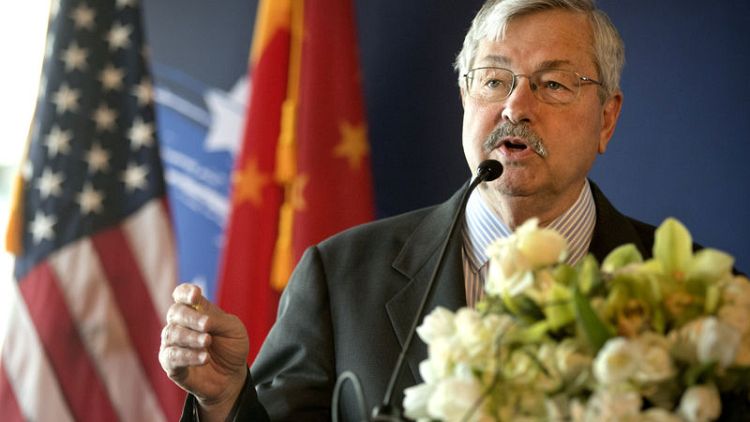By Tony Munroe
BEIJING (Reuters) - A week after an official Chinese newspaper ran a four-page ad in a U.S. daily touting the mutual benefits of U.S.-China trade, the U.S. ambassador to China accused Beijing of using the American press to spread propaganda.
U.S. President Donald Trump last Wednesday referred to the China Daily's paid supplement in the Des Moines Register - the state of Iowa's biggest selling newspaper - after accusing China of seeking to meddle in the Nov. 6 U.S. congressional elections, a charge China denies.
Trump's accusation that Beijing was trying to meddle in U.S. elections marked what U.S. officials told Reuters was a new phase in an escalating campaign by Washington to put pressure on China.
While it is normal for foreign governments to place advertisements to promote trade, Beijing and Washington are currently locked in an escalating trade war that has seen them level rounds of tariffs on each other's imports.
China’s retaliatory tariffs early in the trade war were designed to hit exporters in states such as Iowa that supported Trump’s Republican Party, Chinese and U.S. experts have said.
Terry Branstad, the U.S. ambassador to China and the former longtime governor of Iowa, a major exporter of agricultural goods to China, said Beijing had hurt American workers, farmers and businesses.
China, Branstad wrote in an opinion piece in Sunday's Des Moines Register, "is now doubling down on that bullying by running propaganda ads in our own free press."
"In disseminating its propaganda, China's government is availing itself of America's cherished tradition of free speech and a free press by placing a paid advertisement in the Des Moines Register," Branstad wrote.
"In contrast, at the newsstand down the street here in Beijing, you will find limited dissenting voices and will not see any true reflection of the disparate opinions that the Chinese people may have on China's troubling economic trajectory, given that media is under the firm thumb of the Chinese Communist Party," he wrote.
He added that "one of China's most prominent newspapers dodged the offer to publish" his article, although he did not say which newspaper.
(Reporting by Tony Munroe; Editing by Elaine Hardcastle)


